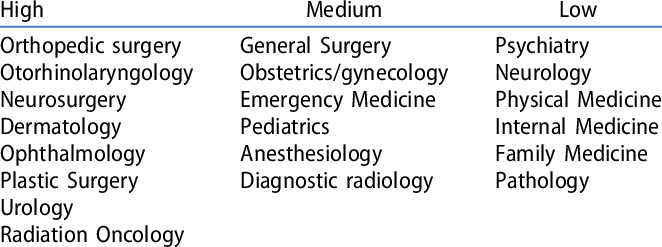12 Most Competitive Medical Specialties
The medical field offers a diverse range of specializations, each catering to a specific area of the human body and its ailments. While some specialties are more prevalent and attract a wider pool of applicants, others stand out for their high degree of competitiveness and demand for qualified professionals. These competitive specialties often require extensive training, exceptional academic performance, and a strong commitment to patient care.
Factors Contributing to Competitiveness
Several factors contribute to the competitiveness of medical specialties. These include:
- Intellectual Challenge: Some specialties, such as neurosurgery and otolaryngology, demand a high level of intellectual prowess and problem-solving skills due to the complexity of the procedures and the intricate nature of the human anatomy.
- Surgical Precision: Surgical specialties, such as orthopedic surgery and plastic surgery, require exceptional dexterity, hand-eye coordination, and meticulous attention to detail, making them highly competitive.
- Lifestyle Considerations: Certain specialties, such as dermatology and ophthalmology, offer a more predictable lifestyle with regular working hours and less on-call responsibilities, attracting a larger pool of applicants.
- Prestige and Compensation: Some specialties, such as radiology and cardiology, are perceived as prestigious and offer high earning potential, further enhancing their competitiveness.
Top 12 Most Competitive Medical Specialties
Based on various factors, including the Match Rate (percentage of applicants successfully matching into their chosen specialty), Average Step 1 Score, and Average USMLE Composite Score, the following 12 medical specialties are considered among the most competitive:
1. Orthopaedic Surgery:
Orthopaedic surgeons specialize in the diagnosis, treatment, and prevention of musculoskeletal conditions, including disorders of the bones, joints, muscles, tendons, and ligaments.
2. Neurosurgery:
Neurosurgeons focus on the diagnosis and treatment of disorders of the nervous system, including the brain, spinal cord, and peripheral nerves.
3. Plastic Surgery:
Plastic surgeons perform reconstructive and cosmetic surgery to restore form and function to various parts of the body.
4. Otolaryngology-Head and Neck Surgery (ENT):
Otolaryngologists specialize in the diagnosis and treatment of disorders of the ear, nose, throat, head, and neck.
5. Dermatology:
Dermatologists diagnose and treat disorders of the skin, hair, and nails.
6. Radiation Oncology:
Radiation oncologists utilize radiation therapy to treat cancer and other malignant tumors.
7. Urology:
Urologists specialize in the diagnosis and treatment of disorders of the urinary and reproductive systems.
8. Ophthalmology:
Ophthalmologists specialize in the diagnosis and treatment of disorders of the eye.
9. General Surgery:
General surgeons perform a wide range of surgical procedures, including abdominal, thoracic, and vascular surgeries.
10. Anesthesiology:
Anesthesiologists administer anesthesia to patients undergoing surgery to provide pain relief and prevent consciousness during procedures.
11. Obstetrics and Gynecology (OB-GYN):
OB-GYNs provide care for women’s reproductive health, including prenatal care, childbirth, and gynecological procedures.
12. Emergency Medicine:
Emergency medicine physicians provide immediate medical care to patients with acute illnesses and injuries.
Factors to Consider When Choosing a Competitive Medical Specialty
Choosing a medical specialty is a significant decision that will shape your career trajectory and impact your overall quality of life. While many medical specialties offer rewarding and fulfilling careers, certain specialties stand out for their high degree of competitiveness and demand for qualified professionals. These competitive specialties often require extensive training, exceptional academic performance, and a strong commitment to patient care.

Before embarking on the journey to pursue a competitive medical specialty, it is crucial to carefully consider the factors that contribute to their competitiveness and make an informed decision aligned with your interests, skills, and lifestyle preferences.
1. Evaluate Your Interests and Passions:
The first step in choosing a competitive medical specialty is to identify your genuine interests and passions within the medical field. What aspects of medicine excite and motivate you? Do you enjoy the intellectual challenge of complex medical problems or the hands-on nature of surgical procedures? Reflect on your experiences in medical school, clinical rotations, and shadowing opportunities to gain insights into different specialties.
2. Assess Your Skills and Abilities:
Each medical specialty demands a unique set of skills and abilities. For instance, neurosurgery requires exceptional hand-eye coordination and meticulous attention to detail, while dermatology demands strong communication skills and a keen eye for skin abnormalities. Critically evaluate your strengths and weaknesses to determine which specialties align with your natural talents and abilities.
3. Consider Lifestyle Preferences:
Medical specialties vary significantly in terms of work-life balance, call schedules, and overall lifestyle demands. If you prioritize a predictable schedule with minimal on-call responsibilities, you may find dermatology or ophthalmology more appealing. However, if you thrive in a fast-paced environment with the opportunity to make immediate impacts, emergency medicine or general surgery might be a better fit.
4. Research and Seek Mentorship:
Conduct thorough research on the competitive specialties that interest you. Explore the specific training requirements, match rates, and career paths for each specialty. Engage with physicians in your chosen field, seek mentorship, and ask questions about their experiences. Attend conferences, workshops, and grand rounds to gain firsthand exposure to different specialties.
5. Engage in Clinical Rotations:
Actively participate in clinical rotations to gain hands-on experience in various medical specialties. Observe the day-to-day activities of physicians in different fields, interact with patients, and participate in patient care. These rotations will provide valuable insights into the daily realities of each specialty and help you refine your preferences.
6. Prioritize Decision-Making:
Once you have gathered comprehensive information and gained practical experience, prioritize your specialty choices. Consider your interests, skills, lifestyle preferences, and career goals. Narrow down your options to a few specialties that align with your aspirations and prepare accordingly.
7. Be Flexible:
The competitive landscape of medical specialties can be dynamic and unpredictable. Be prepared to adjust your expectations and consider alternative options if your preferred specialty proves to be unattainable. Remain open to exploring new specialties and discovering unexpected areas of interest.
8. Consider Geographic Location:
While the competitiveness of specialties is generally consistent across the country, there may be regional variations. Research the availability of residency programs, match rates, and practice opportunities in your desired geographic location.
9. Seek Support and Guidance:
Utilize the resources available to you, including academic advisors, career counselors, and physician mentors. Seek their guidance and insights throughout your decision-making process.
10. Remember the Ultimate Goal:
Ultimately, the choice of a competitive medical specialty should serve your passion for medicine and your desire to make a positive impact on patients’ lives. Stay true to your values and aspirations as you navigate this important decision.
Conclusion
The competitive medical specialties offer a rewarding and challenging career path for dedicated and talented individuals. While the path to these specialties may be demanding, the potential for making a significant impact on patients’ lives is immense. Prospective physicians should carefully consider their motivations, abilities, and aspirations when navigating the competitive landscape of medical specialties.




